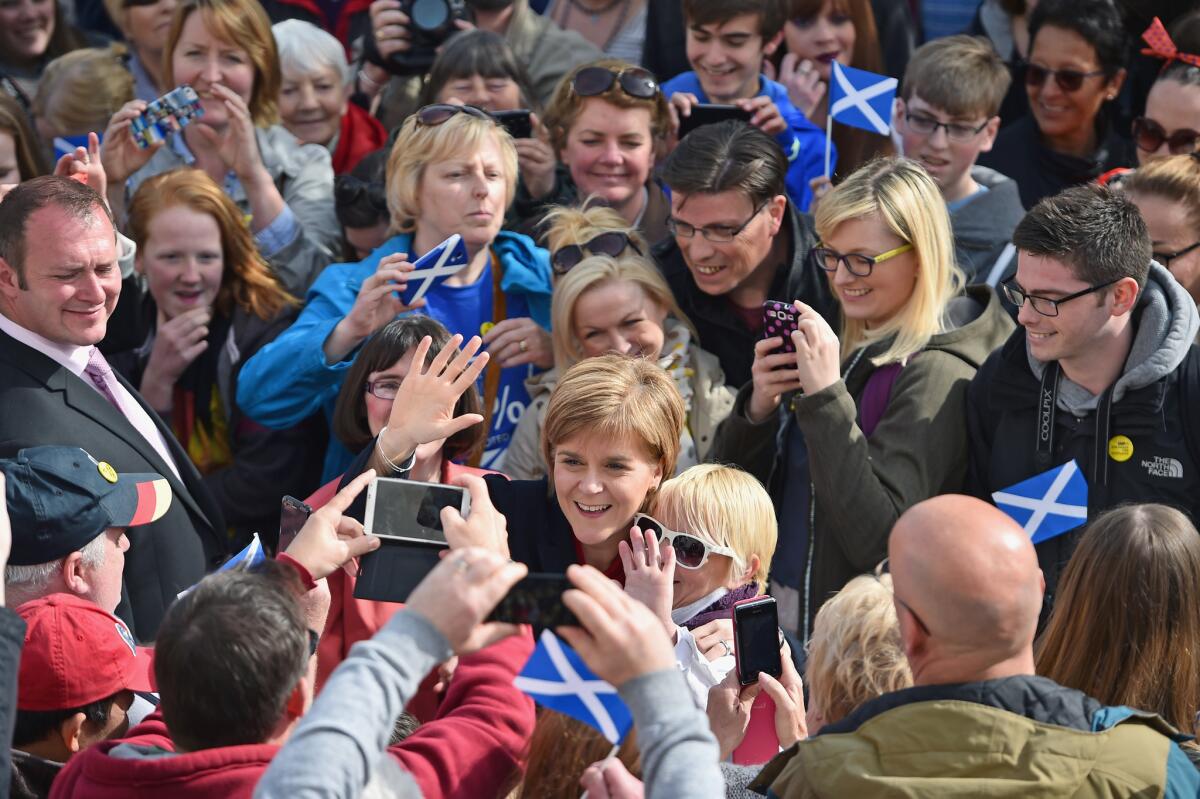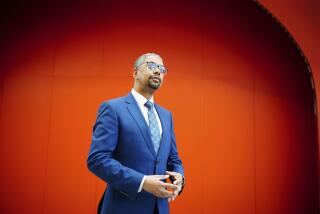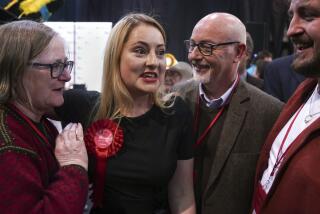Scotland tense ahead of United Kingdom elections this week

Scottish Nationalist Party leader Nicola Sturgeon, lower center, is welcomed by activists and members of the public as she campaigns for Patricia Gibson, a candidate for Parliament.
With only a few days to go until the United Kingdom’s national elections, tensions are simmering in Scotland.
The heads of the two leading parties in Scotland — battered Labor and the ascendant Scottish National Party — took shots at each other Sunday night in their final debate before U.K. polls open Thursday, exposing how much bad blood has arisen between two parties that agree on many key economic issues.
“[British Labor leader] Ed Miliband said he would rather see the Tories back in office than work with the SNP,” Scottish National Party leader Nicola Sturgeon said, in one of several sharply worded statements. “I think that’s pretty appalling.” Sturgeon later called Labor “desperate.”
For his part, Scottish Labor leader Jim Murphy accused the SNP of reckless politics, saying it was “willing to bring down a Labor budget” to advance its own cause.
The campaign between Labor and the SNP in Scotland has highlighted a division that many thought was put to rest when a referendum on Scottish independence was defeated in September. Instead, it has attained new vigor.
And the battle has larger implications. If the SNP gains many seats at Labor’s expense Thursday, it could play kingmaker in the new British government, since neither Miliband’s center-left Labor nor Prime Minister David Cameron’s center-right Conservative Party are expected to win a majority of seats on their own.
That means that despite accounting for only about five million of the U.K.’s 64 million residents, Scotland could swing an election that will determine Britain’s future in the European Union and on the world stage.
The nationalist SNP has undergone a remarkable rise since the “Yes” movement it led lost in September. Under Sturgeon, who took over from Alex Salmond after the defeat, the SNP has more than quadrupled its membership — fueled by a belief among Scots that post-referendum promises from London have gone unfulfilled.
As a result, the SNP, which holds only six seats in the British Parliament, is forecast to win at least 50 of the available 59 seats from Scottish districts when final ballots are counted.
Meanwhile, Labor, which has long maintained a stranglehold on Scottish politics, has unraveled. Come Thursday, the party is expected to lose most if not all of the 41 British Parliamentary seats it holds in Scotland, according to TNS and other polling firms.
The new math has set off a political chess match.
In her bid to lure Labor supporters, Sturgeon has said the SNP wants to work with Labor (although not as part of a formal coalition) and also positioned itself as a party that aims to be part of any Miliband-led coalition.
But Miliband and Murphy have sought to put distance between themselves and the SNP, fearing that an association with a Scottish nationalist movement could hurt them with English voters. At Sunday’s debate, Murphy took aim several times at Sturgeon, portraying the SNP as a party that is quietly planning a new independence referendum and seeking to pin down Sturgeon on a commitment against further bids.
Cameron and the Tories, meanwhile, have sought to use the rise of the SNP to their own advantage with English voters, telling them essentially that flipping the lever for Labor means voting for the Scottish nationalist group.
“The fact is that Labor cannot win a majority on their own. They can only get into Downing Street with the support of the SNP,” Cameron said in a campaign speech last month. Scottish Conservative leader Ruth Davidson, who remains personally popular in Scotland even though her party is a non-factor, also hammered the point at Sunday’s debate.
Despite the “Better Together” unity campaign that won by a margin of about 10 percentage points in September, the issue of Scottish independence has retained vigor. The fact was highlighted last week when the Scottish and English editions of Rupert Murdoch’s Sun newspapers atypically diverged on their election endorsement, with the former recommending the SNP and the English edition pushing for the Tories.
At a Labor rally in Glasgow on Monday, Murphy and the comedian Eddie Izzard, who supports the party, were even heckled by a small number of nationalist supporters, forcing the pair to abandon the event early. Sturgeon condemned the hecklers.
On the streets of Edinburgh, there has been less fanfare than during the referendum vote, with fewer election signs and less overt campaigning. Still, the questions of nationalism and Scottish representation hung in the air.
On Leith Walk, a main thoroughfare in the city’s northeastern neighborhood, candidates from the Liberal Democrats and other parties pumped hands with voters, hoping to attract those fleeing Labor but unsure about the SNP.
As bikers and joggers made their way through the city’s Hollyrood Park later in the evening, many said they were doing something they never expected a few months ago: look toward the nationalists.
Lisa Webb, an environmental worker who was raised in Edinburgh, encapsulated the feelings of many Scots as she exercised.
“I voted no on the referendum, but I think might vote for the SNP now,” she said. “The way Labor has carried itself has really not appealed to me. And I’d never vote for the Tories.”
Twitter: @ZeitchikLAT
More to Read
Start your day right
Sign up for Essential California for news, features and recommendations from the L.A. Times and beyond in your inbox six days a week.
You may occasionally receive promotional content from the Los Angeles Times.







